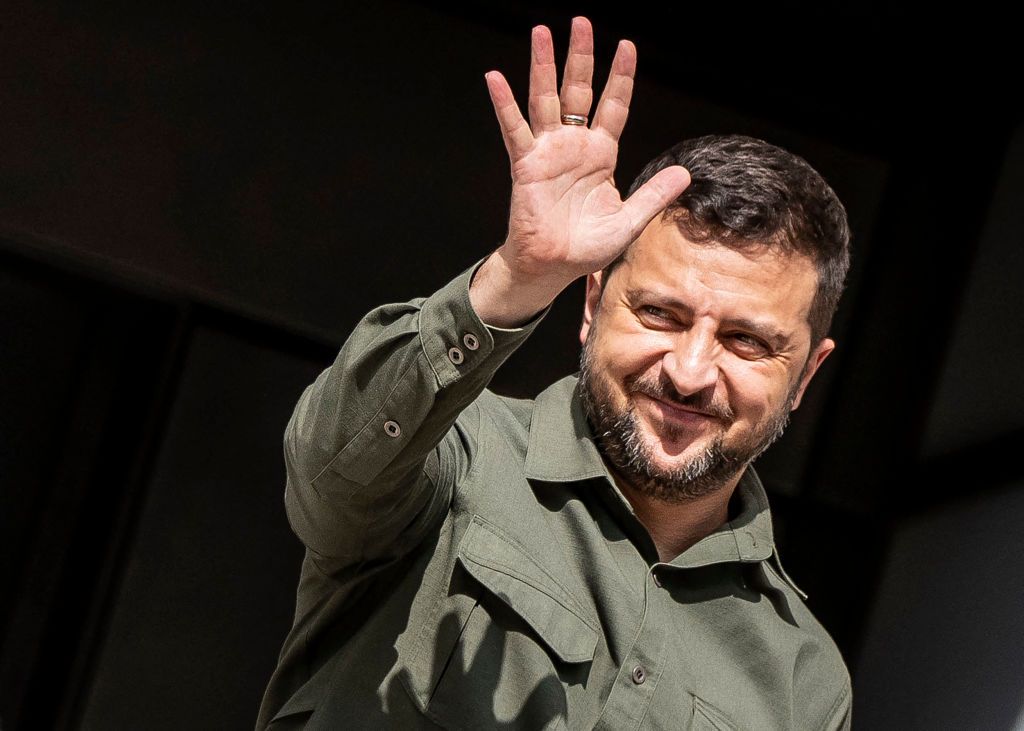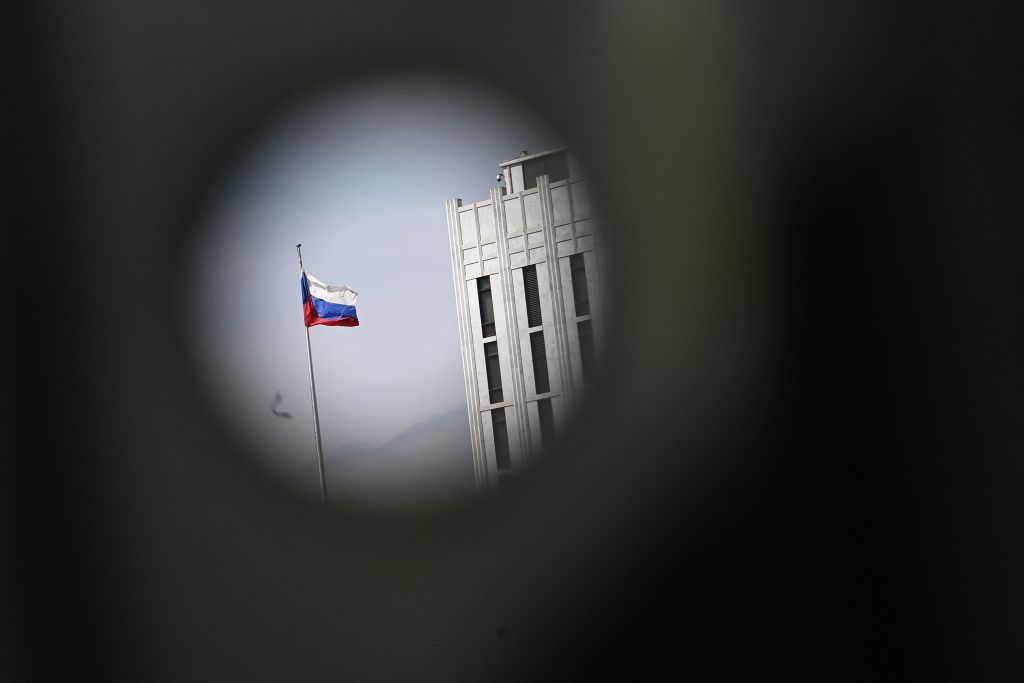Opinion: Russia’s shadow fleet strategy draws from Iran’s playbook
As Russia’s shadow fleet mirrors Iran’s playbook, the growing threat of petro-dictatorships underscores the need for coordinated international responses to safeguard maritime security and global stability.

A sailor watches as a ship from Russia's Black Sea Fleet passes off the shore of the Russian-occupied city of Sevastopol, Ukraine, on May 11, 2017. (Dmitry Kostyukov/AFP via Getty Images)

Mykola Kolisnyk
Iran’s recent missile attacks against Israel serve as a stark reminder of the growing audacity of petro-dictatorships in flouting international norms and undermining global peace. Iran, emboldened by Russia’s relentless and indiscriminate assaults on Ukraine – targeting everything from hospitals and kindergartens to power stations with Iranian-made missiles and drones – highlights the perilous outcomes of unchecked aggression by these regimes.
Despite facing (often limited) Western sanctions, these regimes operate with impunity, fueled by their ongoing revenue from oil exports. The Kremlin has generated over 670 billion euros ($726 billion) since its full-scale invasion of Ukraine started.
Russia, in particular, has drawn inspiration from Iran’s playbook, observing how Tehran circumvents Western embargoes on crude exports by creating a shadow fleet of tankers. Iran’s fleet operates outside standard regulations and monitoring systems, enabling the regime to sell oil at discounted prices with the help of complicit states like China. Russia has also adopted tactics from the sanctions-evading shadow fleets of Venezuela, North Korea, and Oman.
While Russia does not face the same embargoes as Iran, it is subject to the G7 and European Union oil price cap introduced in 2022 to prevent Russian oil exports from legally selling above $60 per barrel. This measure is designed to curb Russia’s oil revenue and deter further aggression against Ukraine. In response, Russia has taken the concept of the shadow fleet to new heights, creating an unprecedented network of hundreds of oil tankers dedicated to evading the price cap and bolstering the Kremlin’s war chest.
The scale of Russia’s shadow fleet is staggering, with estimates ranging from 300 to 1,400 tankers servicing oil exports since 2022, all registered under flags of various countries. The ambiguity of this market poses significant risks to maritime safety and the environment.
Over the past two years, numerous close calls and minor incidents have occurred in Asia and Europe, including a major malfunction in Danish waters in March 2024. The aging infrastructure of many shadow tankers, approximately 80% of which are over 15 years old, increases the likelihood of malfunctions, collisions, and spills, further endangering coastal communities and ecosystems. The escalating situation poses enormous risks to law-abiding ships, the environment, and the countries where these accidents occur.
Experts have highlighted issues with Russia’s key regional partners' manipulation of ship-to-ship transfers, as seen in Yeosu, South Korea. Further problematic transfers have been discovered in Oman, Yemen, Spain, and other countries. In early 2024, approximately 115,000 barrels per day were categorized as “Other Unknown” volumes, transported on tankers with no clear destination. Many of these cargoes travel from Russia’s western ports to the Suez Canal, with some arriving in Turkey. Others are transferred, often near Greece.
Elizabeth Braw from the Atlantic Council aptly characterizes Russia’s use of the shadow fleet as a calculated strategy to export corruption and undermine international rules. This tactic is part of a broader pattern of Russian aggression, including military provocations against NATO forces and interference with maritime trade in the Black Sea.

The impunity Russia enjoys in these endeavors sets a dangerous precedent for other rogue states like Iran, which adopt similar tactics to project power and destabilize strategically important regions. This enables Iran’s navy and proxies, such as the Houthis, to engage in piracy and threaten global shipping in the Persian Gulf and Suez Canal.
After all, why wouldn’t Russia and Iran feel emboldened to export terrorism, corruption, and havoc? If NATO members like Denmark, Norway, and the U.K., who are witnessing a massive increase in the Russian shadow fleet near their shorelines, do nothing to stop it despite the significant risks, why would less powerful coastal states take action?
We must pressure governments to implement decisive measures to counter this threat, including heightened economic and diplomatic pressure on flag states.
It’s chilling to read accounts that Denmark, Norway, and Sweden fear Russian retaliation and thus do nothing. Despite over two years of Russia’s full-scale war and the presence of the Russian shadow tanker fleet since late 2022, the U.K. and Scandinavian governments have remained silent and inactive in terms of actual countermeasures against the fleet.
Civil society organizations recently intervened, petitioning the U.K. government and staging open sea protests in Sweden. Swedish authorities began to show public concern only after these actions, albeit without making concrete promises. They suggested potential actions in the next sanctions package and proposed discussions within EU bodies. However, these statements lack binding commitments, marking the first time the EU will address this sanctions loophole since Russia’s full-scale invasion of Ukraine in February 2022.
Addressing the threat posed by Russia’s shadow fleet requires a multi-faceted approach. Firstly, raising awareness about the significant risks associated with these covert operations is crucial, as they extend beyond the war in Ukraine to encompass environmental degradation and harm to coastal communities worldwide.
Collaboration among Western nations to share intelligence on tanker movements and ownership structures is essential. G7 and EU countries should intensify pressure on flag states, compelling them to take responsibility for vessels flying their flags and imposing diplomatic and economic sanctions on those that fail to comply. The buildup of shadow tankers should be prevented by restricting the sale of tankers, especially by EU and G7 entities, to operators who do not adhere to sanctions or the price cap policy and to Russian or undisclosed buyers.
Enforcing sanctions that target not only the crude oil but the entire shadow fleet network is crucial. This comprehensive approach entails escalating sanctions from individual vessels to encompass the entire network while enhancing price cap enforcement mechanisms. Moreover, sanctions should be directed at all entities facilitating the transport of crude oil through shadow fleets, with particular emphasis on mother tankers employing flagrant and often illegal flag-switching tactics.
Despite political challenges, Western allies must recognize that the potential costs of Russia’s military advantage in Ukraine, funded by petrodollars, far outweigh the risks of occasional minor global oil price fluctuations. As clean energy becomes cheaper and more dominant, such fluctuations become less dramatic.
Measures such as implementing a complete embargo on Russian energy exports and gradually implementing secondary sanctions on non-compliant countries are necessary steps toward halting Russian oil exports globally. Only with such measures can the cash flow to Russia’s war chest be curtailed, paving the way for peace in Ukraine.
Editor’s Note: The opinions expressed in the op-ed section are those of the authors and do not purport to reflect the views of the Kyiv Independent.













